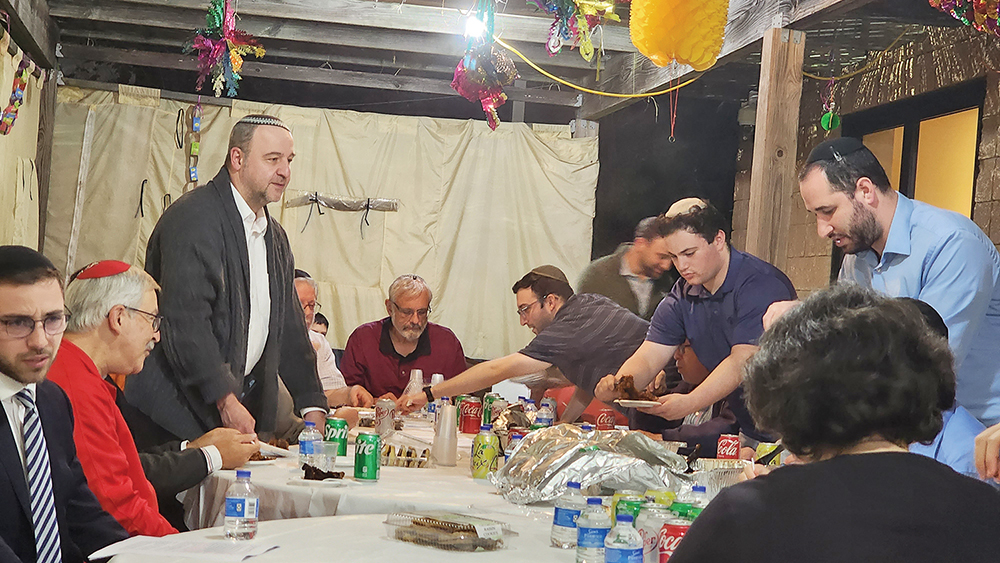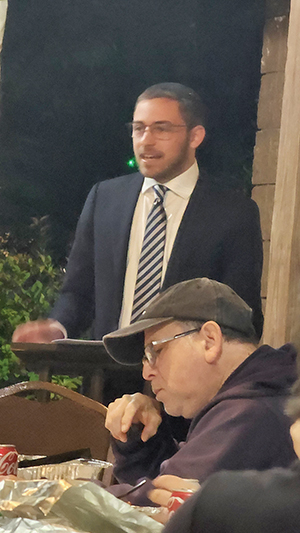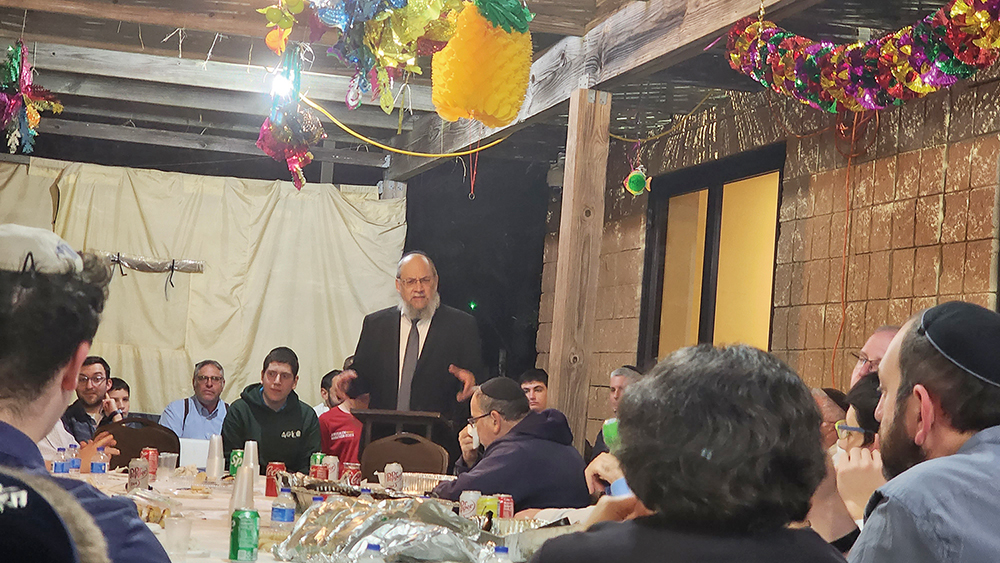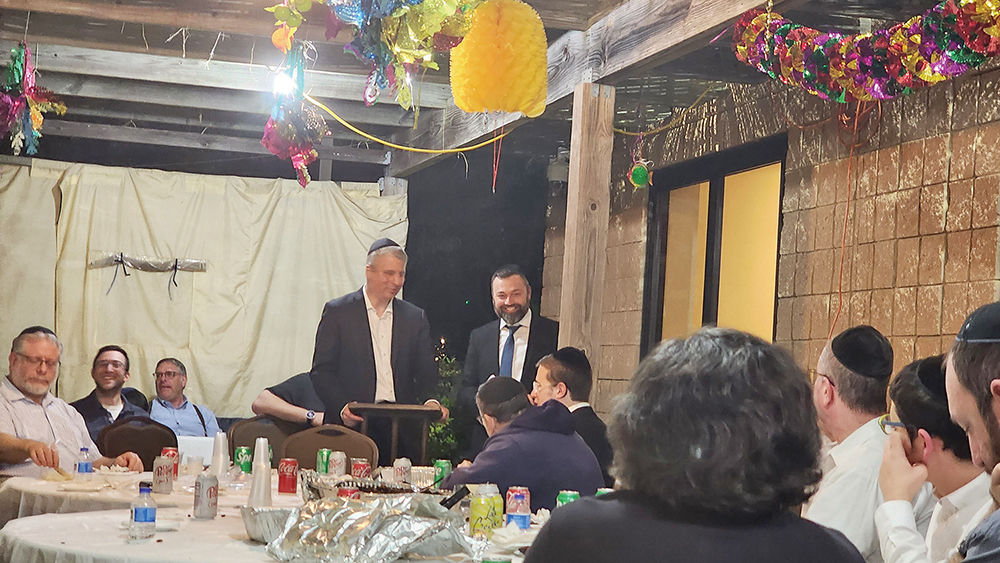
A Tikkun Leil Hoshana Rabba was held on Thursday evening, October 5, at Congregation Ahavas Achim’s sukkah in Highland Park. Featuring beverages and a hot buffet from barbecue masters KoSoCo, the 50-plus attendees were treated to meaningful shiurim while enjoying the surprisingly warm evening.
Robin Schwartz, Highland Park resident, said she came specifically to hear Rabbi Dovid Komet, but was looking forward to a great learning opportunity.
One of the sponsors of the event, Jeff Mann, said that his involvement was logical. “Hoshana Rabba is my father’s [Aaron Mann’s] yahrzeit. He devoted his life to teaching, education and inspiring others with Torah. It is a perfect opportunity to honor his memory.”
Congregational Rabbi Steven Miodownik introduced the “all-star lineup” that included Rabbi Ariel Schneider, Ahavas Achim rabbinic intern; Rabbi Komet, maggid shiur, Heichal HaTorah, Teaneck; and Rabbi Shlomo Landau, director of mentorship, Olami noted educator and lecturer.

Rabbi Schneider began his segment asking the group why there are two holidays—Simchat Torah and Shavuot—that appear to celebrate the same thing. The Jewish nation wholeheartedly accepted the Torah on Shavuot—without knowing all that was in it. After months of critical study and commitment, at Simchat Torah we can celebrate our happiness with what we accepted. No longer a blind acceptance, we celebrate with joy, singing and dancing.
The connections between Pesach/Shavuot and Sukkot/Simchat Torah were also explored by Rabbi Schneider. The freedom experienced in leaving Egypt culminated with the receipt of the Torah on Shavuot. Physical freedom was experienced on Pesach; spiritual freedom and the connection to Hashem began on Shavuot. Sukkot and Simchat Torah are seen as the preservation of the physical freedom seen on Pesach and continuation of spiritual freedom. The singing and dancing is the recognition of the joy that we may not have the opportunity to show in our daily lives that are occupied with day-to-day responsibilities.
Rabbi Komet began his presentation with a riddle: “What can’t be done on Yom Tov, but can be done if Shabbat and Yom Tov coincide?” The answer stumped everyone. Rabbi Komet joked that it could be said that there is no answer to the riddle and the talk would end quickly. The surprising answer began an interesting presentation on the often misunderstood topic of muktza (prohibited to be moved on Shabbat). Most people presume that Shabbat is more stringent than Yom Tov, since one is allowed to cook on Yom Tov—while cooking is not permitted on Shabbat. Chazal note that the concept of muktza on Yom Tov was strengthened so that people would take it and the holiday seriously. People already take Shabbat seriously, so there is room for leniency.

Things that are needed for Shabbat and Yom Tov are acceptable to be moved and used—food, drink, utensils, etc. As an example Rabbi Komet noted that, generally, a rock would be considered muktza. However, if it was your custom to use a rock as a bottle stopper, then it could be used on Yom Tov. The Gemara has a Mishna that defines the status of a cow that is past its prime and no longer provides milk, yet is kept to later provide meat. What is permitted if the cow dies on Shabbat? Can the animal be cut up and fed to a dog? Yes, one may cut the animal and feed it to the dog. One can be lenient regarding muktza on Shabbat because of the particular circumstances. Going into the Shabbat, the animal was alive and intended for human food later. The changing circumstance is that of the animal dying.
Another example is the prohibition of using wooden house beams for firewood on Yom Tov if the regular wood supply runs out. If the original intention was to use the wood in home construction, you cannot change its use to become firewood on Yom Tov. The two examples show changing circumstances, with the difference being whether it happens on Shabbat or Yom Tov. It can be seen that Yom Tov is more stringent than Shabbat.
After a brief break, Rabbi Landau began with a conversation overheard 26 years ago at Aish HaTorah. A young man was bemoaning the fact that his soul was contaminated as he was a baal teshuva who had eaten non-kosher food. The young man was told that Reish Lakish said that a person who repents from fear has his intentionally committed sins turn to accidental ones and his accidentally committed sins become mitzvot. Someone who repents from the love of Hashem has all their sins turned to merits, and every bite of non-kosher food would become a mitzvah. Hoshana Rabba is the last possible time to repent, from the beginning of Elul though Sukkot—preferably from love of Hashem, to turn the sins to mitzvot.
Rabbi Landau continued with an interaction he had with some seventh- and eighth-graders. Knowing that he had a friend traveling to Israel the next day, he invited them all to write a note to be placed in the Kotel. How impressed he was that one of the students wrote: “Dear God, I love you,” and the true expression of gratitude to Hashem that is the root of everything.

It is true we mostly cry to Hashem when we need something; it is rare to just be thankful and appreciative of what blessings we have. A man seen crying at the Kotel was asked what he needed and how he could be helped. The man replied that the many tears were tears of gratitude. He had just come from the wedding of his youngest child and he was thanking Hashem for giving him the livelihood and funding to merit marrying off 12 children!
Rabbi Landau concluded with a story of how a man’s rebellious youngest son ran off. The father told the son that he was loved and that he would be welcomed home no matter what happened. The father waited on the porch for years until the son came home. When the son arrived, he was immediately enfolded in his father’s loving arms. The son tries to apologize for his past actions and is told by his father to only look forward to the future and that it is only important that he is home. Hashem is waiting for us on the porch; we only need to come home and try to be better in the future.
Josh Fine spearheaded the planning and arrangements for what has become an annual event.
Rabbi Miodownik summed up the evening perfectly: “An opportunity to spend the last night of Sukkot learning and growing together as a shul.”












